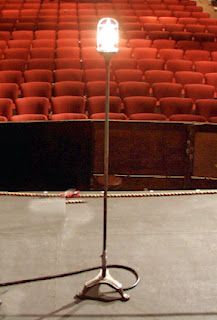Tourists now make up 60% of the Broadway audience and seeing
a Broadway show for most of those folks means seeing a big, splashy musical.
And if it has a title they already know, so much the better. Critics tend to be New
Yorkers and while they like musicals too, their tastes tend toward, how should
I say, more serious stuff.
Which is why despite what the critics may be saying,
audiences may be pleased with Escape to Margaritaville, the jukebox musical
built around the songs of Jimmy Buffett that is now playing at the Marquis
Theatre; and Frozen, Disney's stage version of its megahit animated film, which
is at the St. James Theatre.
To be honest, they're not the kinds of shows that hit my
sweet spot either. And yet, I had a pleasant enough time at each. That's largely
because both shows are competently put together and are unabashed in their
desire to please.
That's particularly true of Escape to Margaritaville which
extends the laid-back aesthetic that has become Buffett's trademark right out
into the lobby where tequila baristas whip up margaritas ($16 for frozen, $12
for straight) that aren't bad at all.
A bar is featured onstage too. In the story that TV sitcom
writers Greg Garcia and Mike O'Malley have cobbled together, it's the place at
Margaritaville, the eponymous down-on--its-heels Caribbean resort, where
visiting tourists congregate.
They're kept soused and happy by the nice-guy bartender
Brick (played with goofy charm by Eric Petersen) and his pal Tully, a
good-looking-and-great-abs musician (played by the good-looking-and-great-abs Paul
Alexander Nolan) who not only plays the guitar and sings but also entertains
some ladies with weeklong romances.
The lives of both men are turned upside-down with the arrivals of
Tammy (the always-sympathetic Lisa Howard who develops a fondness for Brick
even though she's on a pre-wedding vacation before she's supposed to marry a
lout back in Cincinnati) and her best friend Rachel (a somewhat bland Alison
Luff as a workaholic environmentalist who's initially determined to resist Tully's
charms).
Also on hand are Rema Webb as the resort's irascible owner Marley,
Don Sparks as an old hippie named J.D. who's given to tall tales about past
adventures and buried treasure and is sweet on Marley, plus a hard-working
20-member ensemble.
Most of the action, including a threatened volcano eruption,
is dictated by titles and lyrics to Buffet's most popular songs such as
""Margaritaville," "A Pirate Looks at Forty," "Cheeseburger
in Paradise" and, of course, "Volcano," all of which are listed alphabetically
in the program so fans can see which of their faves made the cut (click here to read about the making of the show).
They're mainly the kind of catchy tunes that get people
swaying in their seats and director Christopher Ashley, last year's Tony winner
for helming Come From Away, does everything he can to keep the party mood going. But
your enjoyment of the show is probably going to be determined by how big a fan
you are of Buffet's music. The fiftysomething guy sitting next to me seemed to
know the words to all the songs and he looked to be having a great time.
The twentysomethings sitting next to me at Frozen had a
great time too. The 2013 movie was celebrated for putting sisterly love at the
center of this story, which is set in a fairytale Norway and focuses on two
young princesses who become estranged when the elder, Elsa, develops the power
to freeze whatever she touches, including her younger sister Anna.
But the move is best known for the Oscar-winning anthem "Let
It Go," written by Kristen Anderson-Lopez and Robert Lopez, performed on
the soundtrack by Idina Menzel and sung endlessly in living rooms across America
by legions of little girls.
Disney originally tapped Alex Timbers, the director of such
offbeat shows as Bloody, Bloody Andrew Jackson and Peter and the Starcatcher,
to transfer Frozen to the stage but later changed its mind (click here to read more about that) and brought in the
more mainstream British director Michael Grandage, who has produced the kind of
show that a 1950s grandma would have felt comfortable taking her grandkids to see.
The book by Jennifer Lee, who also wrote the screenplay,
hews close to the movie. When their parents die, as parents in children's
stories almost always do, Elsa (here played by the stiff but clarion-voiced Caissie
Levy) becomes queen but soon hides away in an isolated ice palace so that she won't hurt anyone.
That leaves Anna (a spunky and winning Patti Murin) to seek
solace and companionship in the too-good-to-be-true Hans (John Riddle), a
prince from a neighboring country but still determined to find her sister with
the help of a stalwart peasant named Kristoff (who, in a nod to non-traditional
casting, is played by the African-American
actor Jelani Alladin).
Once again, the familiar elements are there— the cartoonish
sidekicks, Kristoff's reindeer Sven and the talking snowman Olaf, and, of
course several helpings of "Let it Go"—but magic can be harder to
recreate onstage than it is on screen.
Grandage and set designer Christopher Oram have come up with
simple but sometimes beautiful ways to recreate the snow storms (click here to read about how their approach) but they don't inspire awe the way the
movie's effects did. The new songs that the Lopezes have written fit in with
the original score but none of them is a standout. And more importantly, the story's
edges have been softened and sits feminist message has become muddier.
None of this, I hasten to say, stopped the young
women next to me—nor the scores of little girls in the audience, some decked
out in Elsa costumes—from having a good time. Like Escape to Margaritaville, Frozen
is a show for people who were fans of it before they even bought their tickets.
The rest of us should probably seek our entertainment elsewhere





